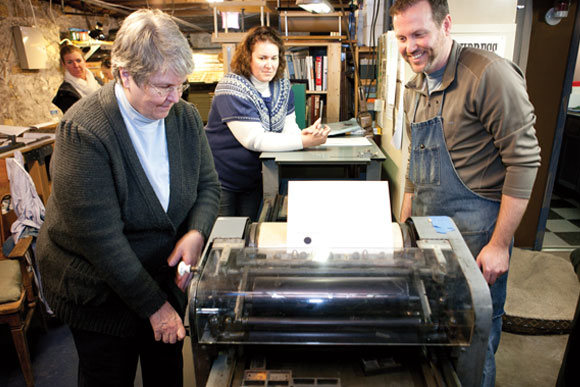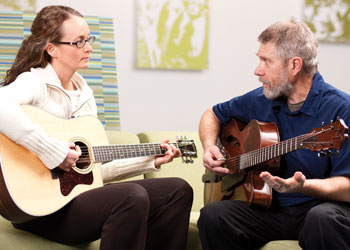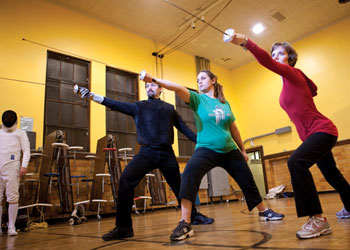by Erick R. Schmidt // Spring 2011

After all the skills and hobbies Communiversity has brought into their lives—like car repair, gardening, yoga and guitar lessons—Liz Donnelly and her family feel like regulars when they walk into a class. Most recently, Liz, the family matriarch, enrolled herself and two daughters in a letterpress class. It was the latest in a series of courses the family has taken during the past 25 years.
For Donnelly and her seven children (six daughters, one son), partaking in Communiversity classes has become a family tradition. “It’s fun to have my children share these things together,” Liz said. “We’ve spent a lot of time laughing and talking about classes we’ve taken.”
Communiversity is the community’s adult education program sponsored by UMKC’s Office of Student Involvement. Now 40 years old, Communiversity celebrates its role in educating nearly 1,500 registrants per semester.
Donnelly began taking the classes out of necessity: she needed to know how to care for the family’s car. But she now seeks out classes more for entertainment than gaining life skills. “In almost every class, I’ve met very interesting people and teachers who are very interested in what they’re teaching,” she said.


Community adult education exploded in popularity during the 1960s, but unlike many adult education programs that establish a list of courses and then fill those classes with interested teachers, Communiversity has always allowed participants to submit their own ideas for classes they’d like to teach.
If anyone understands the accomplishment of Communiversity’s 40 years, it’s Rick Mareske. He has served as program coordinator since 1978. The secret to its success? Mareske said it comes down to the philosophy of Communiversity. “It’s a chance for people to share a skill or an idea with other people. It creates a venue that makes that possible so people don’t have to do their own marketing,” he said. “For the people who sign up, it’s pretty casual and it doesn’t cost much. They just go for it.”
The method has been enticing to thousands of students and teachers, some of whom have participated for 20 years or more. One of those is Stanley Parsons, a retired UMKC history professor who taught at the University from 1964 to 1990. Parsons has transferred his knowledge into teaching two Communiversity courses per semester. “This is the best teaching gig I’ve ever had,” Parsons said. “I’m learning more and reading more and have a chance to prepare presentations, which I never had as a professor.” One reason Communiversity fits both students and teachers, Parsons said, is because everyone in the room is interested in the content. “I prefer having conversations with my students, rather than putting things in their mind. I have that freedom with Communiversity courses,” he said.
Mareske said the mutual interest between students and teachers helps keep class options fresh throughout the years. Despite his extensive history with the program, he said he can’t predict which classes will be popular. He’s seen trends—meditation classes were popular in the ’80s—but he doesn’t bother trying to guess. “You never know. I’m continually surprised by what works and what takes off,” Mareske said.
“If it’s on Oprah, there’s a good chance it’ll be hugely popular.” For example, a surge in the popularity of a Communiversity pole dancing class followed a spot about pole dancing on The Oprah Winfrey Show. In just a few weeks, the class had to be split into sections A through T. Some of the courses with the highest enrollment in 2010 included beer-tasting, art collecting and printmaking.
The most successful class in the program’s history in terms of tangible results was a course in radio production that eventually led to the founding of Kansas City radio station KKFI 90.1 FM. “I like the idea of people having a place where they can create class ideas and try them out, see what works. I think that’s fun,” Mareske says. “It’s improvisational in a lot of ways.”
For information or to sign up for classes, visit the Communiversity website.
